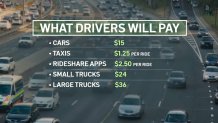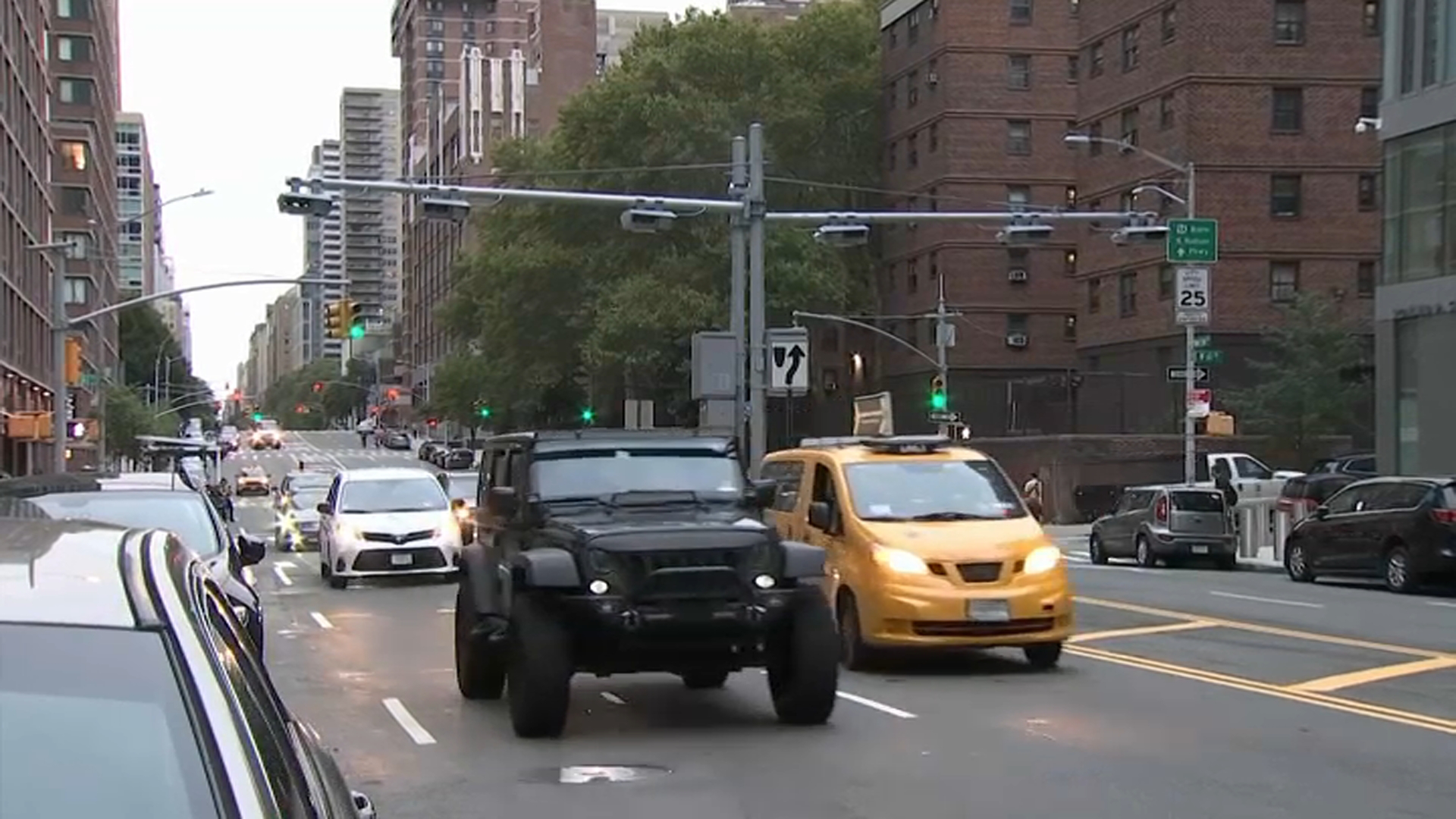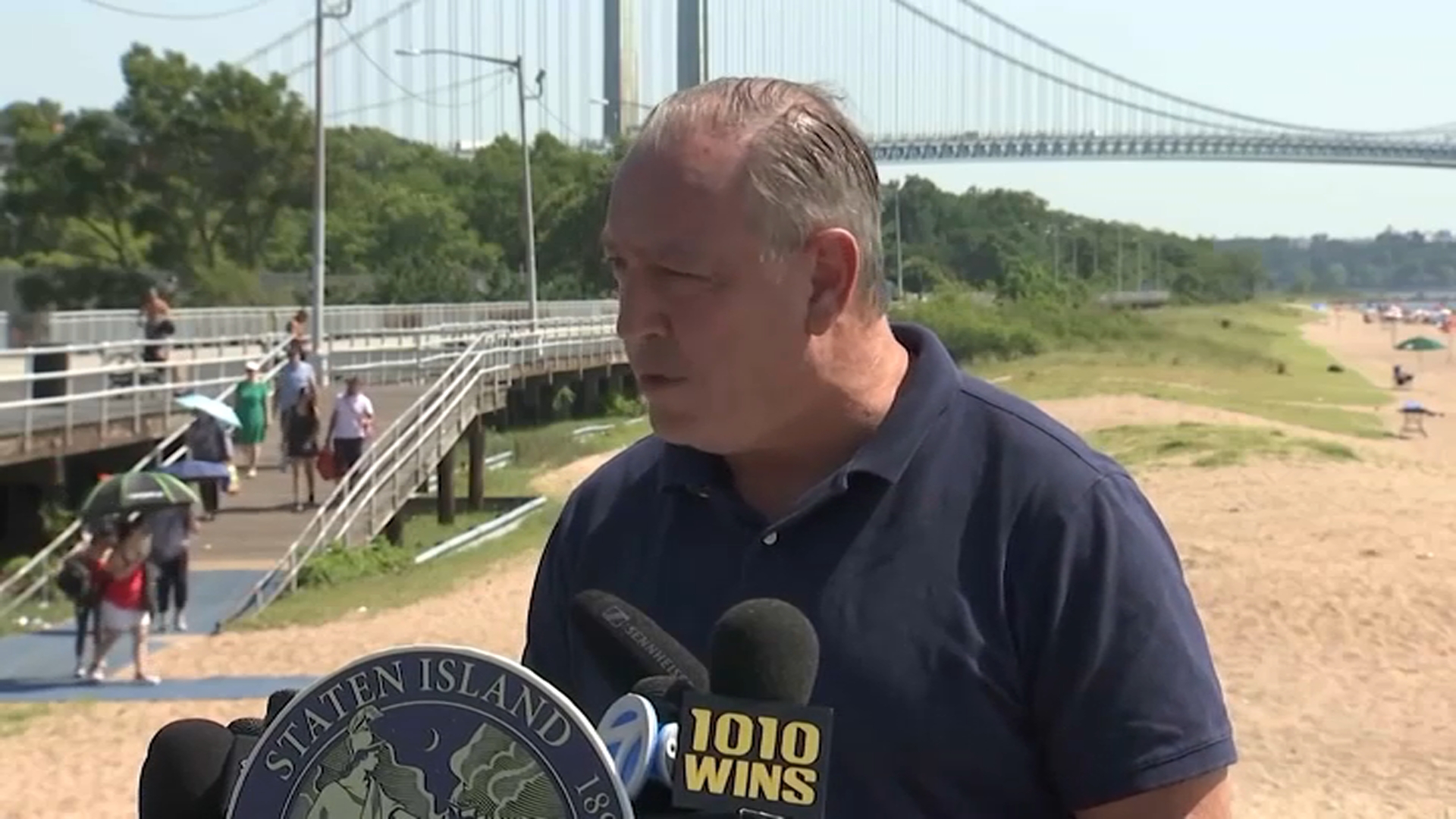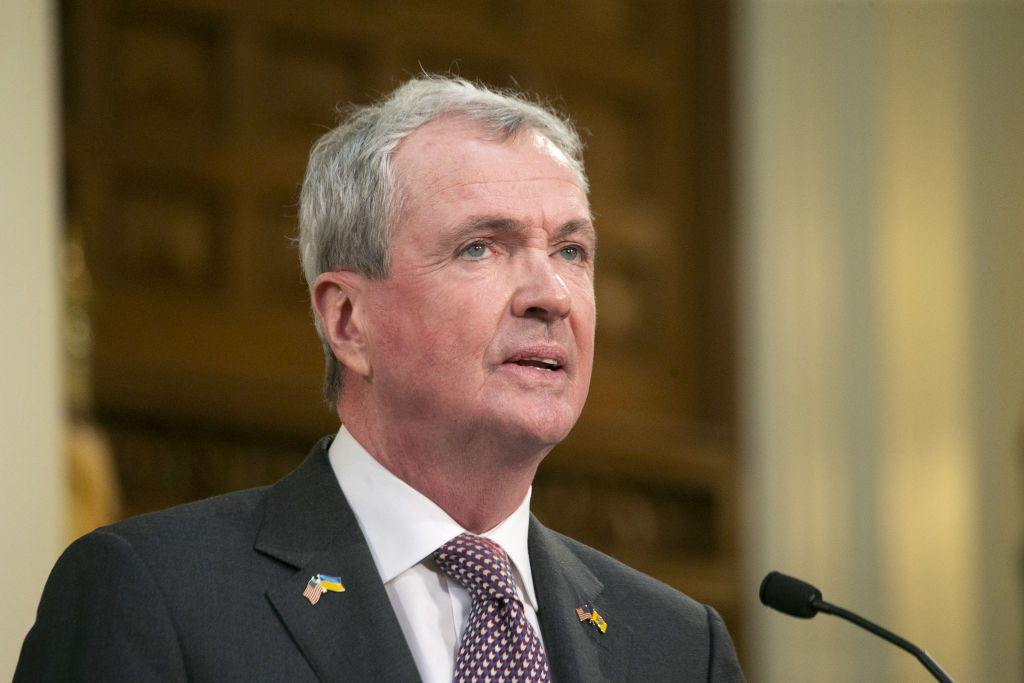What to Know
- Congestion pricing would impact any driver entering what is being called the Central Business District (CBD), which stretches from 60th Street in Manhattan and below, all the way down to the southern tip of the Financial District
- Passenger vehicles would be charged $15, trucks would be charged anywhere from $24-$36 depending on size, and motorcycles would be charged $7.50.
- Taxis face a $1.25 surcharge per ride. The same policy applies to Uber, Lyft and other rideshare drivers, but their surcharge will be $2.50.
The moment drivers from the New York City area have been dreading just got another step closer, as big moves were made in the congestion pricing saga — including recommendations for how much drivers should be charged.
The Traffic Mobility Review Board delivered its report to the Metropolitan Transportation Authority (MTA) board, laying out the general guidelines for the impending tolls, including costs, when certain prices will be in effect, who gets credits and more.
Here's a breakdown of everything that was included in the report:
Get Tri-state area news and weather forecasts to your inbox. Sign up for NBC New York newsletters.
How does congestion pricing work? Who gets charged — and how much?
Congestion pricing would impact any driver entering what is being called the Central Business District (CBD), which stretches from 60th Street in Manhattan and below, all the way down to the southern tip of the Financial District. In other words, most drivers entering midtown Manhattan or below will have to pay the toll, according to the board's report.
All drivers of cars, trucks, motorcycles and other vehicles would be charged the toll. Different vehicles will be charged different amounts, which the review board detailed in their pricing plan recommendation:
- Passenger vehicles: $15
- Small trucks (like box trucks, moving vans, etc.): $24
- Large trucks: $36
- Motorcycles: $7.50

The $15 toll is about a midway point between previously reported possibilities, which have ranged from $9 to $23.
The full, daytime rates would be in effect from 5 a.m. until 9 p.m. each weekday, and 9 a.m. until 9 p.m. on the weekends. The board called for toll rates in the off-hours (from 9 p.m.-5 a.m. on weekdays, and 9 p.m. until 9 a.m. on weekends) to be about 75% less — about $3.50 instead of $15 for a passenger vehicle.
Drivers would only be charged to enter the zone, not to leave it or stay in it. That means that residents who enter the CBD and circle their block to look for parking won't be charged.
The board recommends only one toll be levied per day — so anyone who enters the area, then leaves and returns, will still only be charged the toll one time for that day.
It is important to note that those prices are, for now, just recommendations. The MTA board will still have to vote to approve the prices sent by the Traffic Mobility Review Board, which is an independent agency that is a partner with the transit authority.
The review board said that implementing their congestion pricing plan is expected to reduce the number of vehicles entering the area by 17%. That would equate to 153,000 fewer cars in that large portion of Manhattan.
Do Uber, Lyft and other rideshares get exemptions? What about taxis?
There will be exemptions in place for rideshares and taxis, but much to their chagrin, they won't get away completely scot-free.
The toll will not be in effect for taxis, but drivers will be charged a $1.25 surcharge per ride. The same policy applies to Uber, Lyft and other rideshare drivers, but their surcharge will be $2.50.
New York Taxi Workers Alliance Executive Director Bhairavi Desai said in a statement that the plan is " a reckless proposal that will devastate an entire workforce."
Are there any other exemptions to congestion pricing tolls?
Many groups had been hoping to get exemptions, but very few will avoid having to pay the toll entirely. That small group is limited just to specialized government vehicles (like snowplows) and emergency vehicles.
Low-income drivers who earn less than $50,000 a year can apply to pay half the price on the daytime toll, but only after the first 10 trips in a month, according to the board's report.
While not an exemption, there will also be so-called "crossing credits" for drivers using any of the four tunnels to get into Manhattan. That means those who already pay at the Lincoln or Holland Tunnel, for example, will not pay the full congestion fee. The credit amounts to $5 per ride for passenger vehicles, $2.50 for motorcycles, $12 for small trucks and $20 for large trucks.
Drivers from Long Island and Queens using the Queens-Midtown Tunnel will get the same break, as will those using the Brooklyn-Battery Tunnel. Those who come over the George Washington Bridge and go south of 60th Street would see no such discount, however.
Public-sector employees (teachers, police, firefighters, transit workers, etc.), those who live in the so-call CBD, utility companies, those with medical appointments in the area and those who drive electric vehicles had all been hoping to get be granted an exemption. But the Traffic Mobility Review Board did not include any such exemptions for those groups.
So what comes next, and when will the tolls go into effect?
First, the MTA board will have to vote on the pricing recommendations. It's not entirely clear when that vote will take place, though the board has two meetings before the end of 2023: On Dec. 6 and Dec. 20.
As for when it could go into effect, the MTA has maintained that the goal is to start charging the toll in late Spring 2024.
There had been fears of a toll as high as $23, but MTA Chairman Janno Lieber previously poured cold water on that idea, saying earlier in the year that MTA board members were "trying to keep it well lower than that." He added that in order to keep the standard toll price low, the transit agency would have to keep the number of exemptions low as well.
But even with the lower recommended prices, local leaders from both sides of the political aisle were already looking to take legal action to prevent the congestion pricing plan from charging their constituents.
"It’s ripping off New Jersey commuters to pay for whatever financial hardships the MTA is facing. We’re considering all of our options, including further legal action," said New Jersey Gov. Phil Murphy.
Gov. Murphy previously sent a letter to the Traffic Mobility Board asking for drivers from his state to be exempt, arguing they shouldn’t have to pay for the toll to take the Holland and Lincoln tunnels or George Washington Bridge in addition to an extra fee to go into midtown Manhattan. He argued that toll price should count as a credit toward the fee, to ensure they are not having to pay twice.
New Jersey has filed a lawsuit against the federal government in an effort to block congestion pricing. Staten Island has said it plans to sue the MTA over the plan as well.
"The recently-reported $15 toll to enter Manhattan below 60th St is nothing short of complete highway robbery for the people of Staten Island. This could be one of the worst things to ever happen to Staten Island," said Staten Island Borough President Vito Fossella. "We have said time and time again that all Staten Islanders, especially those who live near the Staten Island Expressway, will have to suffer with more air pollution and more traffic, not to mention this added tax to travel within their own city. For all this, Staten Islanders will see no return on the investment they’ll have no say in making."
The New York City Council also held a hearing on the matter late over the summer. Transit President Richard Davey testified at that hearing, saying the revenue generated from the plan will help make NYC's transit system state of the art — which will benefit everyone.
"That is what congestion pricing is going to buy, investment in our transit system. So we’re excited about taking this next step in the approval process," said Davey.




